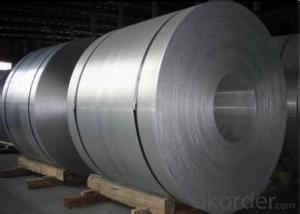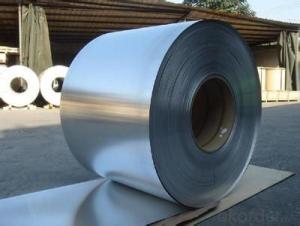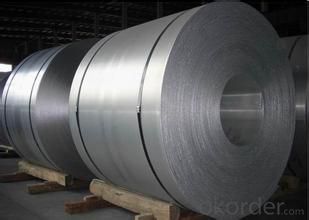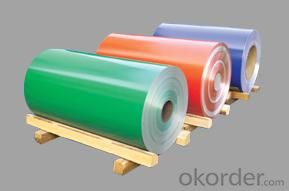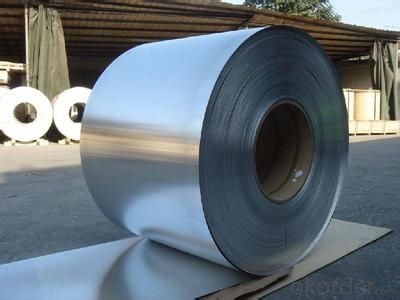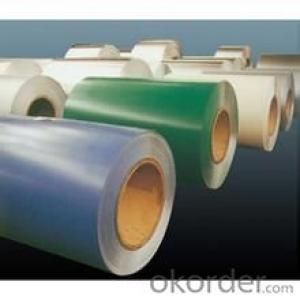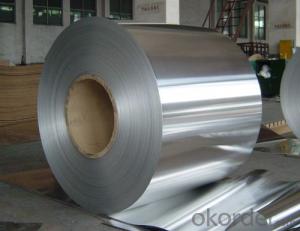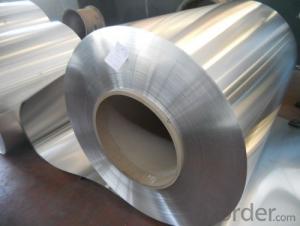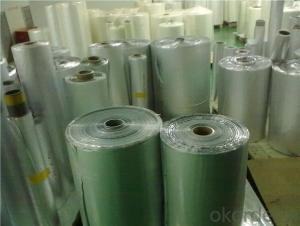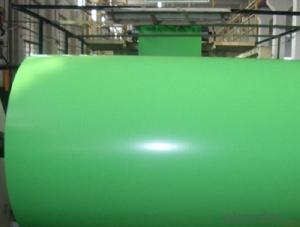Alu roll,mill finish and coated
- Loading Port:
- China Main Port
- Payment Terms:
- TT OR LC
- Min Order Qty:
- -
- Supply Capability:
- -
OKorder Service Pledge
OKorder Financial Service
You Might Also Like
Aluminium is a relatively soft, durable, lightweight, ductileand malleablemetalwith appearance ranging from silvery to dull gray, depending on the surfaceroughness. It is nonmagnetic and does not easily ignite. A fresh film ofaluminium serves as a good reflector (approximately 92%) of visible lightand an excellent reflector (as much as 98%) of medium and far infraredradiation. The yield strength of pure aluminium is 7–11 MPa,while aluminium alloys have yield strengths ranging from200 MPa to 600 MPa. Aluminium has about one-third the densityand stiffness of steel. It is easily machined,cast, drawn and extruded.
Aluminium alloys (or aluminum alloys; see spellingdifferences) are alloysin which aluminium(Al) is the predominant metal. The typical alloying elements are copper, magnesium,manganese,silicon,tin and zinc. There are twoprincipal classifications, namely casting alloys and wrought alloys, both of which are furthersubdivided into the categories heat-treatableand non-heat-treatable. About 85% of aluminium is used for wrought products,for example rolled plate, foils and extrusions.Cast aluminium alloys yield cost-effective products due to the low meltingpoint, although they generally have lower tensile strengthsthan wrought alloys. The most important cast aluminium alloy system is Al–Si,where the high levels of silicon (4.0–13%) contribute to give good castingcharacteristics. Aluminium alloys are widely used in engineering structures andcomponents where light weight or corrosion resistance is required
Specification:
Alloy: AA1050, 1060, 1100,AA3003, 3005, 3015, 5052, 5754, 5083,8011, etc
Temper: H14/16/18/22/24/32,HO etc.
Thickness: 0.2mm—100mm
Width: 100mm—2300mm (Can be slitted)
Inner Diameter:508MM
Coil Weight:500kg-3000kg(Max.)
Application:Foil stock, Circles, Roofing, Can stock, Marine plate,Anti-slipery purpose in vehicles, packing and appliance.
Features:
1. Excellent quality of products
2. Quick delivery
3. Best service to clients
4. BV,SGS avalible
5. No buckle o waveness
6. Tension leveling
7. Certificate of Origin
8. Form A,E
Packaging Detail:
Carton ,Woodenpallet with plastic protection packing ,standard seaworthy packing or as yourrequest.
Production Capacity:
AnnualProduction capacity of 600,000 tons.
Products areexported to United States, Canada, U.A.E, Brazil, Mexico,Thailand, Vietnam,Nigeria etc, over 100 countries andregions all over the world.
Production Line:
CNBM aluminumproduction base is comprised of 18 aluminumannealers, 10 coil and foilmills, 4 continuous production lines, 2hot rolling production line and 3prepainted lines.
FAQ:
1. What is the form of payment?
Normally 30% TT, L/C
2. Type of quotation?
FOB, CFR, CIF
3. Port of loading?
Shanghai port
4. Delivery time?
30 days after client’s deposit
- Q:Aluminum extrusions are bars made with hollow cavities that allow each to be joined easily, using special connectors. The primary difficulty when painting aluminum extrusions centers on the fact that they are nonporous and durable. Each of these traits creates a complication of its own.
- Your question supposes that you need to Paint the Aluminum Extrusion. The more common thing to do is to Anodize the extrusion. This process coats all surfaces with a hard durable coating. There are several colors available. Actually It's common to use Urethane's to paint Aluminum and the primer isn't simply made for metal, but is specifically for Aluminum. A lot of Airplanes are coated every day in this manner. Methods for coating the insides of tubing have been used for a very long time. You basically fill the tube with primer or coating then drain the excess out (dip method) and difficult shapes can be powder coated or electro static coated. Extrusions can be roller coated after cleaning, vinyls work very well with out priming. Think Toothpaste tubes.
- Q:How to pull the aluminum coil purchased into aluminum sheet?
- You can buy flat sheet directly next time to avoid trouble.
- Q:What are the thickness tolerances for aluminum coils?
- The specific grade and alloy of aluminum being utilized can cause variations in the thickness tolerances of aluminum coils. Typically, the range for tolerances in coil thickness is between +/- 0.003 and 0.015 inches (0.076 to 0.381 mm). Nevertheless, it is crucial to acknowledge that various industries and applications might possess their own distinct requirements and tolerances. To ascertain the precise thickness tolerances necessary for a particular application, it is advisable to refer to the appropriate industry standards or specifications.
- Q:What is the lifespan of aluminum coils?
- The lifespan of aluminum coils can vary depending on various factors such as the quality of the coil, installation method, maintenance practices, and environmental conditions. However, on average, aluminum coils can last anywhere from 10 to 20 years or even longer with proper care and maintenance.
- Q:Are aluminum coils suitable for roofing?
- Yes, aluminum coils are indeed suitable for roofing. Aluminum is a highly durable and lightweight material that has been widely used in the construction industry for roofing purposes. It offers numerous benefits such as being resistant to rust, corrosion, and fire, making it an ideal choice for areas with harsh weather conditions or high humidity. Aluminum coils are also known for their excellent thermal conductivity, which helps in reflecting sunlight and reducing energy consumption, leading to lower cooling costs. Additionally, aluminum roofing is easy to install and maintain, providing long-lasting protection for residential, commercial, and industrial buildings.
- Q:What are the common cleaning and maintenance products for aluminum coils?
- Aluminum coils can be cleaned and maintained using various products. One popular option is a mild detergent mixed with water. This mixture can be applied to the coils using a soft brush or cloth, and then rinsed off with water. Another commonly used product is a coil cleaner specifically designed for aluminum surfaces. These cleaners are usually available in spray or foam form and effectively remove dirt, grease, and oxidation from the coils. It is important to carefully follow the manufacturer's instructions when using these cleaners. Additionally, a mixture of white vinegar and water can be used to clean aluminum coils. This natural cleaning solution effectively removes mineral deposits and stains. It can be applied with a cloth or sponge and then rinsed off with water. Regular maintenance of aluminum coils also includes using a coil coating or sealant. These products create a protective layer on the coils, preventing corrosion and extending their lifespan. It is advisable to apply the coating or sealant according to the manufacturer's instructions. When cleaning and maintaining aluminum coils, it is crucial to avoid using abrasive cleaners, bleach, or harsh chemicals as they can damage the coils. If uncertain about the appropriate cleaning and maintenance products for specific aluminum coils, it is recommended to consult the manufacturer's guidelines or seek professional advice.
- Q:Can aluminum coils be used in food processing applications?
- Food processing applications can utilize aluminum coils, as they offer a range of advantages. Aluminum is a widely used and highly adaptable material in the food industry due to its various benefits. Aluminum coils are lightweight, durable, and possess excellent thermal conductivity, which makes them suitable for applications requiring efficient and uniform heat transfer. When it comes to food processing, aluminum coils are commonly employed in equipment such as heat exchangers, evaporators, and refrigeration units. These coils help to cool, heat, or maintain the temperature of different food products during their processing, storage, or transportation. The exceptional thermal conductivity of aluminum ensures that heat is evenly dispersed, thereby aiding in the preservation of food quality and flavor. Furthermore, aluminum is a non-toxic and non-reactive metal, meaning it has no adverse effects on the taste or composition of the processed food. It is also naturally resistant to corrosion, ensuring that the coils do not contaminate the food and can be easily cleaned and maintained. In addition, aluminum is an environmentally friendly and recyclable material, aligning with the increasing demand for sustainable practices in the food industry. Its lightweight nature also contributes to energy efficiency and reduced transportation expenses. In conclusion, aluminum coils are a reliable, efficient, and safe choice for food processing applications. They meet the strict requirements of the industry while ensuring the quality and safety of the processed food.
- Q:How are aluminum coils used in the manufacturing of signage?
- Aluminum coils are commonly used in the manufacturing of signage as they offer durability, flexibility, and weather resistance. These coils are typically cut, shaped, and molded into desired sign shapes and sizes. They can be used as a base material for various types of signage, including billboards, outdoor signs, and traffic signs. The lightweight nature of aluminum coils makes them easy to handle and install, while their corrosion-resistant properties ensure the longevity of the signage.
- Q:What are the typical mechanical properties of aluminum coils?
- The mechanical properties of aluminum coils may differ depending on the specific alloy and temper of the material. However, aluminum coils typically possess the following mechanical properties: 1. Tensile strength: Aluminum coils generally demonstrate a high tensile strength, which refers to the maximum amount of tensile stress a material can endure before breaking. This property is crucial for applications that require the material to withstand heavy loads or stress. 2. Yield strength: Yield strength represents the stress threshold that a material can bear without undergoing permanent deformation. Aluminum coils typically possess a relatively high yield strength, enabling them to maintain their shape and structural integrity under normal operating conditions. 3. Elongation: Elongation refers to the extent to which a material can stretch or deform before fracturing. Aluminum coils usually exhibit a relatively high elongation, making them suitable for applications that involve forming or bending without breaking. 4. Hardness: The hardness of aluminum coils may vary depending on the alloy and temper. Aluminum alloys can undergo heat treatment to enhance their hardness, rendering them more suitable for applications that demand wear resistance or the ability to withstand harsh environments. 5. Fatigue strength: Fatigue strength denotes a material's capacity to resist the formation and growth of cracks under cyclic loading conditions. Aluminum coils generally exhibit good fatigue strength, making them suitable for applications subjected to repeated or fluctuating loads. It is important to note that these properties can vary depending on the specific alloy, temper, and processing conditions of the aluminum coils. Therefore, it is advisable to refer to the material specifications or contact the manufacturer for more precise and detailed information regarding the mechanical properties of specific aluminum coils.
- Q:Are aluminum coils compatible with other materials?
- Yes, aluminum coils are compatible with other materials. Aluminum is a versatile and widely used material that can be easily integrated with various other materials in different applications. For example, aluminum coils can be used in conjunction with copper tubing in air conditioning and refrigeration systems to enhance heat transfer efficiency. Additionally, aluminum coils can be coated or laminated with other materials such as polymers or paints to provide additional protection against corrosion, improve aesthetics, or enhance specific performance characteristics. Therefore, aluminum coils offer compatibility with a range of materials, making them suitable for diverse applications in industries such as construction, automotive, aerospace, and more.
1. Manufacturer Overview |
|
|---|---|
| Location | |
| Year Established | |
| Annual Output Value | |
| Main Markets | |
| Company Certifications | |
2. Manufacturer Certificates |
|
|---|---|
| a) Certification Name | |
| Range | |
| Reference | |
| Validity Period | |
3. Manufacturer Capability |
|
|---|---|
| a)Trade Capacity | |
| Nearest Port | |
| Export Percentage | |
| No.of Employees in Trade Department | |
| Language Spoken: | |
| b)Factory Information | |
| Factory Size: | |
| No. of Production Lines | |
| Contract Manufacturing | |
| Product Price Range | |
Send your message to us
Alu roll,mill finish and coated
- Loading Port:
- China Main Port
- Payment Terms:
- TT OR LC
- Min Order Qty:
- -
- Supply Capability:
- -
OKorder Service Pledge
OKorder Financial Service
Similar products
New products
Hot products
Hot Searches
Related keywords
